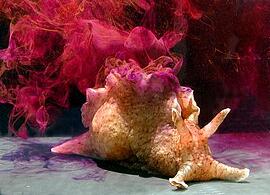
After undergoing cancer treatments such as chemotherapy, many people experience a lapse in memory, known as chemo brain. Along with memory problems, chemo brain can also include having trouble concentrating, taking more time to finish simple tasks, and having trouble multi-tasking. The cause of chemo brain is currently unknown, but researchers at the University of Texas Health Science Center in Houston (UTHealth) have recently discovered a possible cause of chemo brain. (Image on right courtesy of Wikimedia).
Neuroscience researchers at UTHealth recently conducted a study on Aplysia Californica, a classification of sea snails, that tested the drug Doxorubicin which is used to treat many forms of cancer. These sea snails were used because many of their memory mechanisms are similar to those in humans. The researchers discovered that the Doxorubicin drug, when given to the snails, blocked many of the memory mechanisms, and by giving the snails another agent, they were able to unblock the mechanisms.
Once Doxorubicin was administered to the snails, the life science researchers compared cell cultures from snails given the drug with cultures from snails not given the drug to look for differences. In the snails that were given the drug, the researchers were able to identify a neuronal pathway that had stopped properly passing along information, showing where the memory loss occurs. Once they administered an unnamed experimental drug to the snails who were already affected by the Doxorubicin, they could reopen the blocked pathway.
Lead researcher John H. Byrne, Ph.D from the UTHealth department of Neurobiology and Anatomy explained that “our research has implications in the care of people given to cognitive deficits following drug treatment for cancer.”
The unnamed drug they tested on the snails, however, is not appropriate for humans, but it does show that with further research, there is the possibility to help stop the memory loss from chemo brain.
Speaking for the research team, Byrne explained the they “want to identify other drugs that can rescue these memory mechanisms."

View of Texas Medical Center with the Houston skyline in the background (photo courtesy of Wikimedia)
The University of Texas Health Science Center in Houston is one of 21 institutions associated with the Texas Medical Center. TMC is the largest medical complex in the world and all the TMC associated institutions combined receive over $1 billion in life science funding each year, making this thriving research market a great place for scientific supply companies to show off their products to active researchers. The ongoing wealth of funding that TMC receives in the form of public and private grants, awards, and gifts is used to purchase new supplies for labs, help start-up new projects, assist with ongoing clinical trails and research, and construct new research buildings.
- In total life science R&D expenditures in 2012, University of Texas M. D. Anderson Cancer Center ranked 13th with $614,604,000, Baylor College of Medicine ranked 22nd with $474,700,000, and
University of Texas Southwestern Medical ranked 23rd with $435,085,000.
- The University of Texas M.D. Anderson Cancer Center is constructing a $198 million hospital expansion and renovating existing hospital space, expected to be completed in 2015.
- The Department of Defense awarded a $75 million 5-year grant to bioengineers at Rice University and The University of Texas Health Science Center at Houston.
- An $8.4 Million, four year grant from the National Human Genome Research Institute has been awarded to the Baylor College of Medicine.
Biotechnology Calendar, Inc. holds an annual BioResearch Product Faire™ event at TMC that brings together life science researchers and lab product vendors to interact in a friendly and professional environment, where researchers are actively seeking new products to help with their research programs. Last year, life science vendors at TMC were able to provide millions of dollars in research equipment to University of Texas Health Science Center researchers. For more information about the upcoming 15th annual BRPF at Texas Medical Center, visit the links below.



